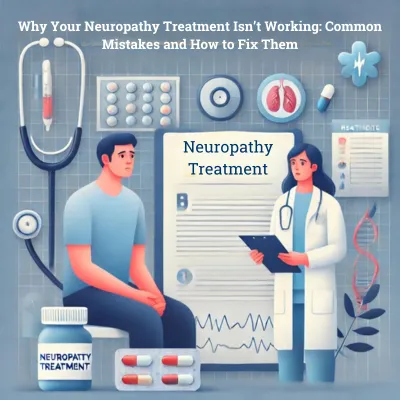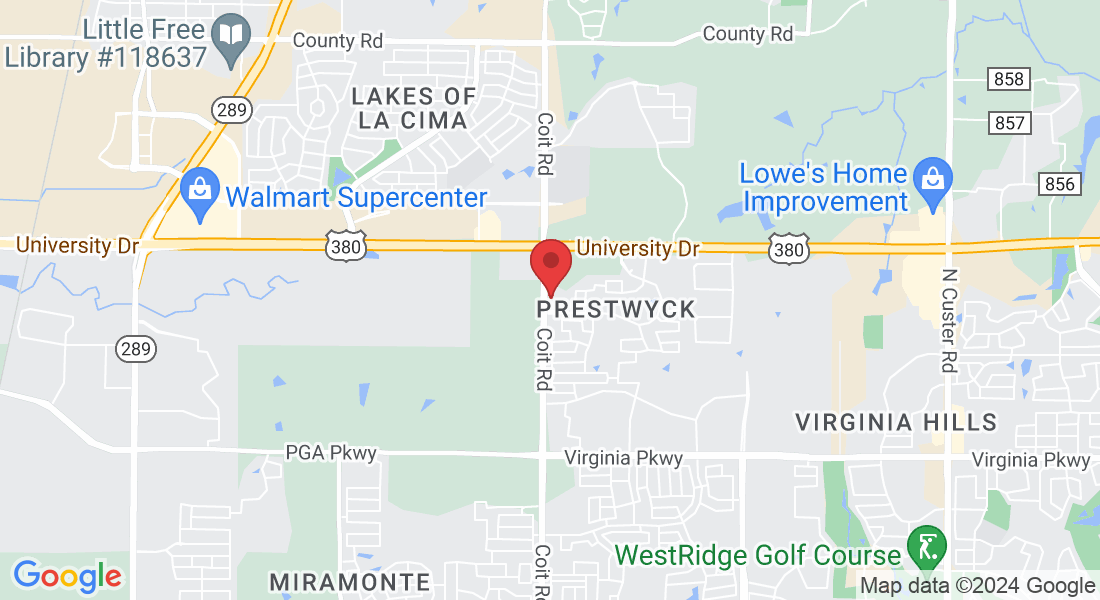Blog

Why Your Neuropathy Treatment Isn’t Working: Common Mistakes and How to Fix Them
Dealing with neuropathy is tough, whether you're in Frisco, McKinney, or Prosper. You might be trying everything—medications, therapies, even lifestyle changes—only to find that your symptoms are still there, maybe even getting worse. If this sounds familiar, you're not alone, and there’s a good reason why this might be happening. In this article, we’re going to dive into some of the most common mistakes people make when treating neuropathy and, more importantly, how you can fix them to finally get the relief you deserve.
1. Relying Solely on Medication
Let’s start with one of the biggest mistakes: relying solely on medication. Many people with neuropathy, whether they’re living in Frisco, McKinney, or Prosper, are prescribed drugs like gabapentin or neurontin, which can help manage pain but don’t address the root cause of the problem. These medications were not originally designed to treat neuropathy, so while they might provide some temporary relief, they don’t do anything to fix what’s really going on with your nerves.
Take Sarah, for example. She spent years bouncing from one medication to another, each time feeling a bit of relief but never truly getting better. Her symptoms always came back, sometimes worse than before. Why? Because the medications were only masking the symptoms, not treating the underlying issue. It's like trying to fix a leaking roof by just catching the drips in a bucket—the real problem still exists, and it’s only going to get worse over time.
What You Can Do:
Instead of relying solely on medication, it’s important to consider treatments that address the root cause of neuropathy. Approaches like nerve re-education and low-level light therapy focus on helping your body heal from the inside out, targeting the actual problem to help you find lasting relief.
2. Ignoring the Importance of Nutrition
Another mistake that’s often overlooked is the role of nutrition in managing neuropathy. Your diet plays a huge part in how your body functions, especially when it comes to nerve health. A diet high in sugars and starches can make neuropathy symptoms worse by decreasing the efficiency of nitric oxide in your body, a key component in maintaining healthy blood flow and nerve function.
Tom was one of our patients from McKinney who didn’t realize how much his diet was affecting his symptoms. He was diligent with his medications and therapy but hadn’t changed his eating habits. Once we introduced a nutritional protocol designed specifically for neuropathy, Tom started seeing real improvements. It was like his nerves were finally getting the nourishment they needed to heal.
What You Can Do:
Don’t underestimate the power of nutrition. Following a diet that supports nerve health by improving blood flow and reducing inflammation can make a significant difference in your recovery. Simple changes to your eating habits could help your body combat neuropathy more effectively.
3. Not Addressing the Underlying Cause
Neuropathy often has an underlying cause that needs to be addressed before real progress can be made. Conditions like diabetes, poor circulation, or even certain medications can contribute to nerve damage. Unfortunately, traditional treatments sometimes overlook these root causes, focusing instead on symptom management.
Lisa, another one of our patients from Prosper, came to us after years of dealing with numbness and tingling in her feet. She had tried everything, but nothing worked because her diabetes was going unchecked. Once we identified and managed her diabetes, we were able to create a treatment plan that finally started to alleviate her neuropathy symptoms.
What You Can Do:
If you’re treating the symptoms without much success, it might be time to look deeper. A holistic approach that considers your overall health and any underlying conditions is crucial. Addressing the root cause of your neuropathy is essential to finding effective and long-lasting relief.
4. Delaying Treatment
The last mistake is one that can have the most significant impact: delaying treatment. Neuropathy is a progressive condition, meaning it gets worse over time if not properly treated. The longer you wait, the harder it becomes to reverse the damage. This is why early intervention is so critical.
Mike, from Frisco, was someone who delayed getting help because he hoped his symptoms would just go away. By the time he came to us, his neuropathy had progressed significantly, making treatment more challenging. Although we were able to help him improve, Mike wishes he had sought treatment sooner.
What You Can Do:
If you’ve been putting off treatment, it’s important to take action now. The sooner you start, the better your chances of finding relief and preventing further damage. Early intervention is key to managing neuropathy effectively and improving your quality of life.
Take the Next Step Toward Relief
If any of these mistakes sound familiar, you’re not alone—and it’s not too late to make a change. Understanding and addressing the root causes of neuropathy, alongside considering nutritional adjustments and timely treatment, can lead to significant improvements in your symptoms.
At the Neuropathy Pain Institute, we’re dedicated to helping you find the relief you’ve been searching for. Whether you’re in Frisco, McKinney, or Prosper, we encourage you to take control of your health. If you’re ready to explore a more effective approach to treating your neuropathy, we invite you to watch our free on-demand webinar: Understanding the Root Cause of Neuropathy. This webinar will give you valuable insights into how you can finally get the relief you deserve.
Get In Touch
Proudly Servicing Frisco, McKinney, and Prosper
Address Office :
1400 N Coit Rd STE 204 McKinney TX 75071
Get The App

Copyright 2023 - Neuropathy Pain Institute™️ | Disclaimer




